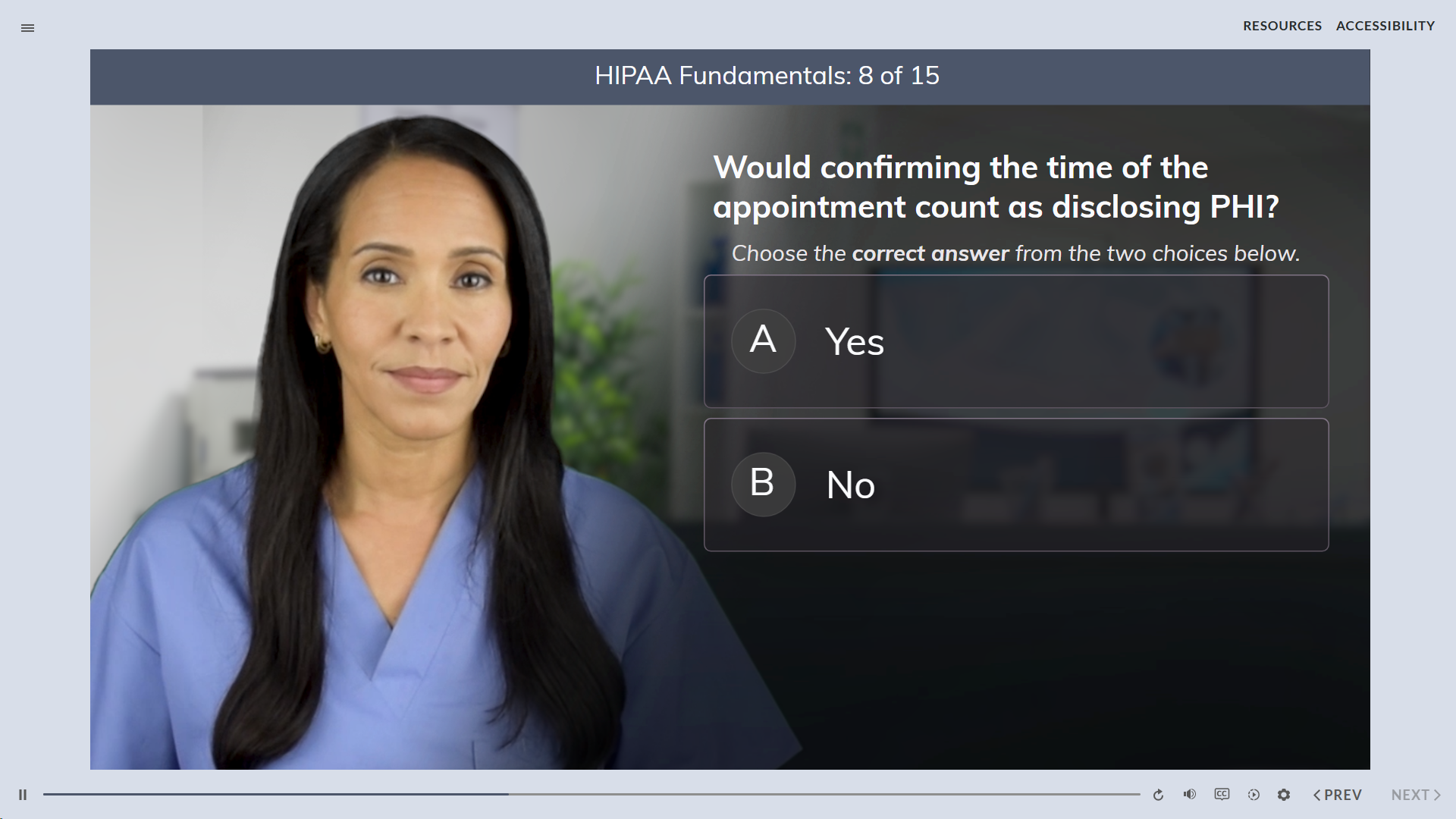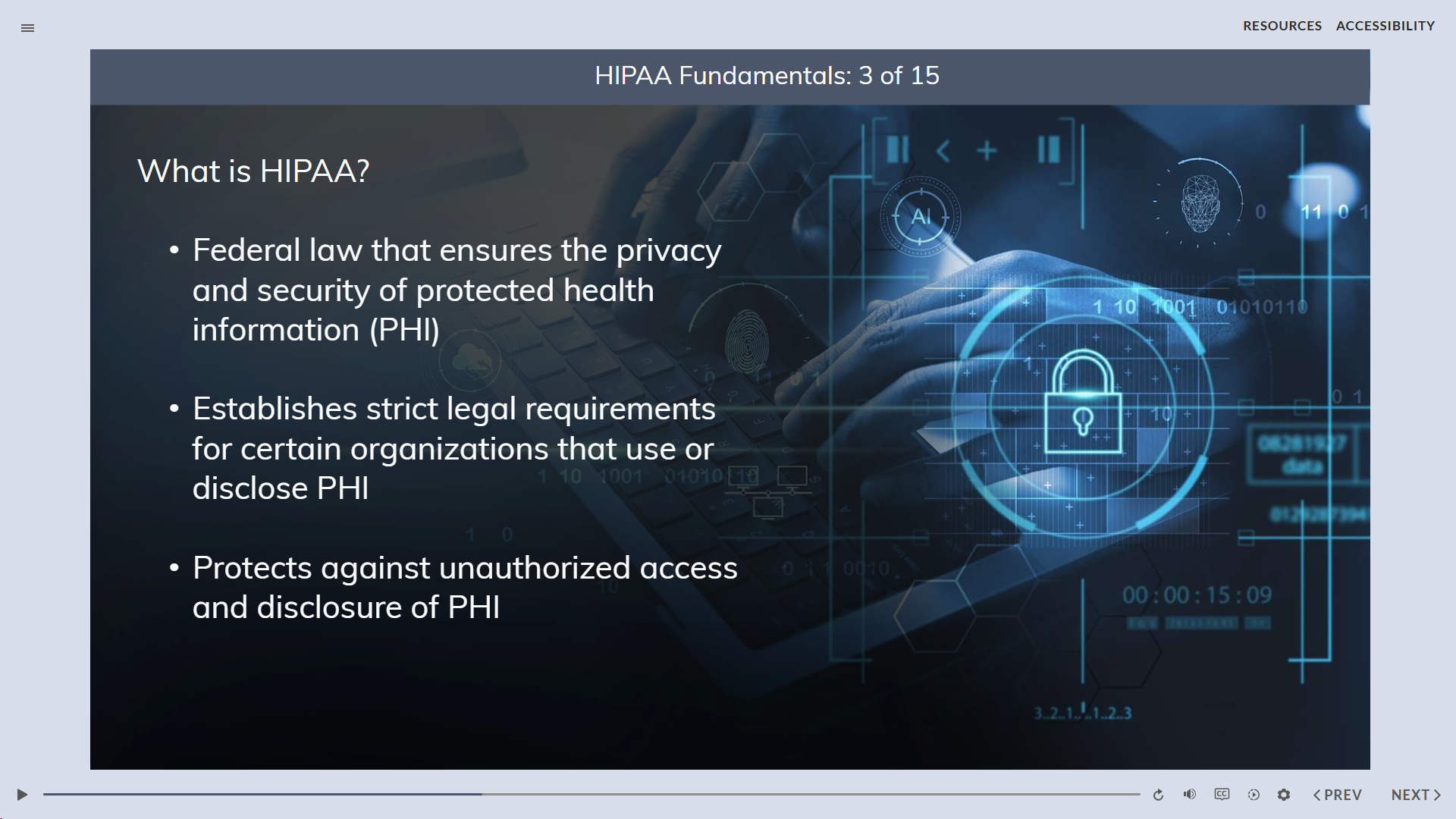
Employee HIPAA Training for the Workplace
Ensure that your employees understand how to safeguard the privacy and security of protected health information (PHI) under the Health Insurance Portability and Accountability Act (HIPAA).
Course description
Traliant’s HIPAA training is a 20-minute course designed for employees of covered entities (such as healthcare providers, health plans and healthcare clearinghouses) and business associates (third party businesses that provide covered entities with services such as insurers, lawyers, accountants, and IT specialists) with access to protected health information (PHI). The course helps employees understand how to protect PHI under HIPAA’s privacy rule (including limits on the use and disclosure of PHI) and security rule (the use of appropriate administrative, physical, and technical safeguards). It also covers the HITECH Act and Texas-specific rules under the Texas Medical Practice Act (TMPA).
ONLINE TRAINING
Employee HIPAA Training for the Workplace

HIPAA training covers these topics and more:
- HIPAA fundamentals
- What is Health Insurance Portability and Accountability Act (HIPAA)?
- What is Texas Medical Practice Act (TMPA)?
- Who are covered entities and business associates?
- What is protected health information (PHI)?
- The privacy rule
- Authorized access
- Documenting and reporting disclosures of PHI
- Written authorization
- Minimum necessary standard
- The security rule
- Security risks
- Safeguards (administrative, physical, technical)
- The breach notification rule
- What is a breach?
- Reporting breaches
- Prohibition on retaliation related to reporting
THE TRALIANT DIFFERENCE
Compliance you can trust.
Training you will love.

Legal expertise
Our in-house legal team monitors the latest laws, rules and regulations, so you don't have to. You can rest assured that our courses are continuously compliant.

Brilliant training
With cinematic-quality videos produced by our Hollywood-based team, your employees will love our customizable, interactive, story-based training.

Valued partnership
Our main focus? It’s all about making your job easier. We do that with unmatched responsiveness and seamless deployment, dedicated to driving your success.

Meaningful impact
We don’t just deliver brilliant training, we help you create meaningful impact by broadening your employees' perspectives, achieving compliance and elevating culture.
KEY FEATURES
Why you'll love our training
It’s time to embrace a new era of online training with a valued partner who will ensure seamless implementation to fit your exact, a truly enjoyable learning experience and courses with continuous compliance you can trust.
Compliance expertise
Traliant's in-hour legal expertise ensures training is accurate and kept up-to-date with any regulatory changes.
Accessible to users with disabilities
Traliant provides an inclusive experience for all users, including those with disabilities, by going beyond Section 508-C standards and offering WCAG 2.1 AA.
Story-based learning
Our story-based approach blends leading instructional design with Hollywood talent to produce engaging, interactive and nuanced training.
Course administration
Traliant makes it simple to roll out training to your workplace and provide technical support directly to your employees at no additional cost.
Course customizations
Tailor courses to include your logo, relevant policies, workplace images, and more. Traliant can even customize the course with scenarios that take place in your own workplace environment.
Translations
Training is available in English, Spanish and is supported in over 100 languages.
COMPLIANCE EXPERTISE
Your partner in training compliance

Uniquely qualified in-house compliance team
Our exceptional in-house Compliance Advisory Team is led by Michael Johnson, Chief Strategy Officer and former U.S. Department of Justice attorney who has provided training and guidance to organizations like the Equal Employment Opportunity Commission, Google, the United Nations, and the World Bank.

Keeping you compliant, effortlessly
Keeping up with the complex web of employment laws — especially if your workforce spans multiple states — can be tricky. That’s why we offer a streamlined training solution that ensures you stay compliant with federal, state, and local regulations, so you can focus on what matters most: your team.

Simplifying your policies and handbooks
Crafting an employee handbook that meets legal standards can be daunting. Let us ease the burden. We help you navigate regulatory changes to ensure your policies and handbooks not only comply with the law but also reflect industry best practices.
What to consider when choosing the most effective HIPAA training

- Minimize legal and financial risks: HIPAA violations can result in significant fines and penalties for both organizations and individuals. Training helps organizations to comply with HIPAA regulations and to protect themselves from these risks.
- Maintain patient trust: HIPAA training helps to promote a culture where employees understand the importance of protecting patient privacy and confidentiality.
- Create a strong security culture: Training helps to ensure that employees are aware of the security risks associated with PHI and that they follow best practices for handling and storing this information.
- Empower employees: Training provides employees with the knowledge they need to understand the company's HIPAA policies and the rules related to handling PHI.
- Strengthen your organization's compliance program: A robust HIPAA training program is an essential component of a strong compliance program, helping to mitigate legal and reputational risks.
- Promote a culture of data privacy and security: Training helps to build a culture where employees understand that the protection of PHI is paramount.
- Name, address, date of birth, Social Security number, and other identifying information.
- Medical records, treatment information, and billing information.
- Genetic information.
- Mental health information.
- Authorized access: PHI can only be accessed by individuals who have a legitimate need to see it.
- Written authorizations: Patients have the right to authorize the use and disclosure of their PHI.
- Minimum necessary standard: Covered entities and business associates should only disclose the minimum amount of PHI necessary for the intended purpose.
- Implement administrative, physical, and technical safeguards: These safeguards help to protect PHI from unauthorized access, use, or disclosure.
- Develop and implement policies and procedures: Establish policies and procedures to protect PHI and to respond to breaches.
- Train employees: Provide employees with training on HIPAA compliance and security best practices.





